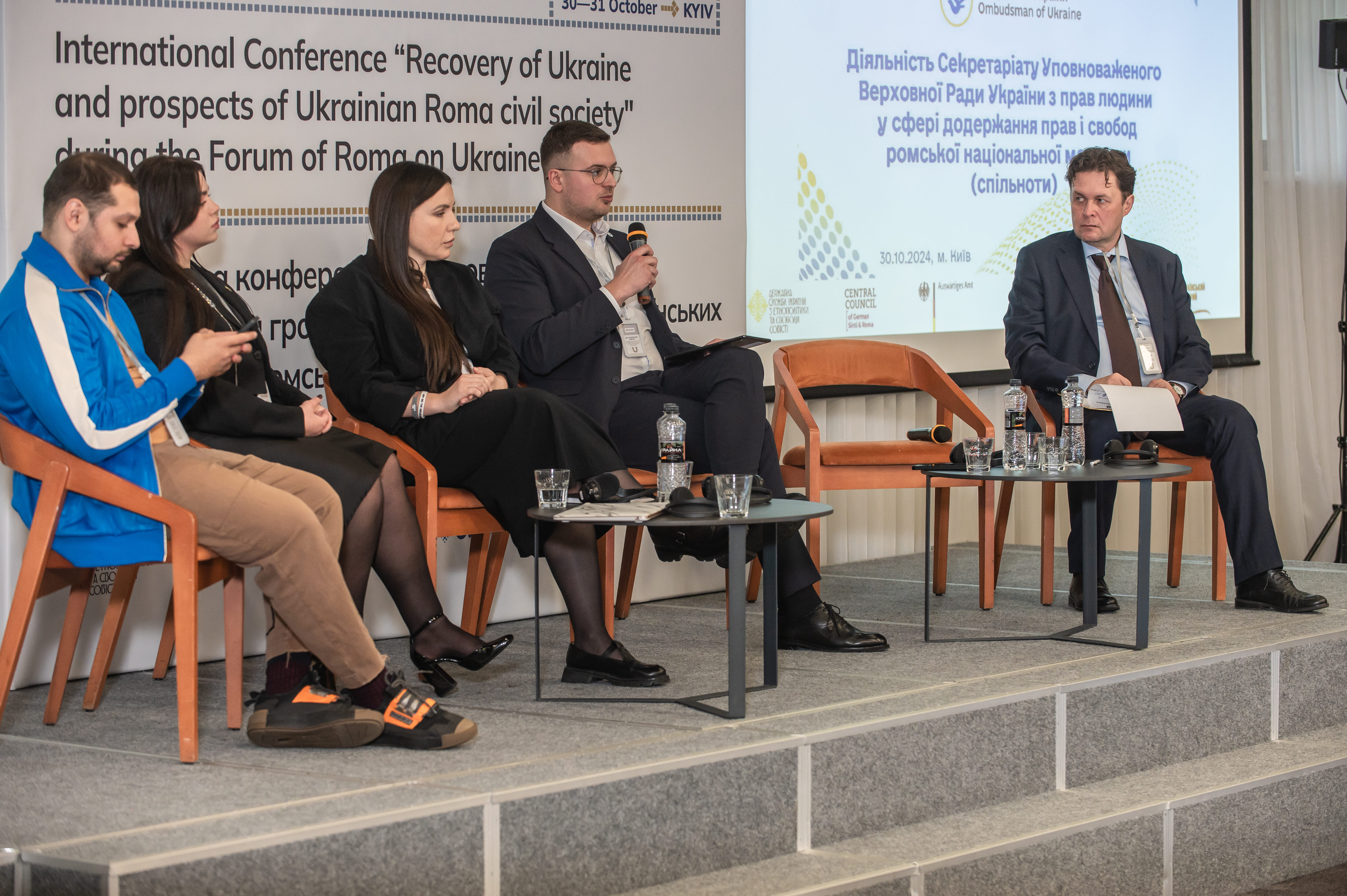Roma and Post-War Ukraine: from acceptance to participation on equal terms
Modern-day Ukrainian society has to become fully aware of the fact that Romanis constitute an integral part of our country. The contribution of the Romani community into Ukraine’s struggle for its freedom and independence, the incessant support for humanitarian initiatives prove that the reconstruction of Ukraine is not possible without the active participation of the Romani community.
This was the topic of the international conference entitled «Restoration of Ukraine and Civil Society Prospects for Ukrainian Romanis» which took place in Kyiv on the 30th of October this year. It was co-organised by ARСA Youth Agency for Roma Culture Advocacy and the Ukrainian State Service for Ethnic Policy and Freedom of Conscience and was supported by international partners. The participants discussed integration of Romanis in the post-war Ukraine, prospects of post-war development and European integration, and ways in which we can improve the condition of this ethnic community so that Ukraine be strengthened and its accession to the EU can be sped up.
The way towards equality is, however, complicated. As per data of the most recent studies, the level of anti-Gypsyism in Ukraine remains high whereas the social distance with respect to Roma is one of the largest if compared to distance to any other ethnic group. Notwithstanding this, the Roma continue fighting for their rights, dignity, and their place in society. And the conference opens the possibility for an open dialogue. It is thus important that its results be known and heard, so that it becomes a step towards proper integration of Roma into the restoration of Ukraine.
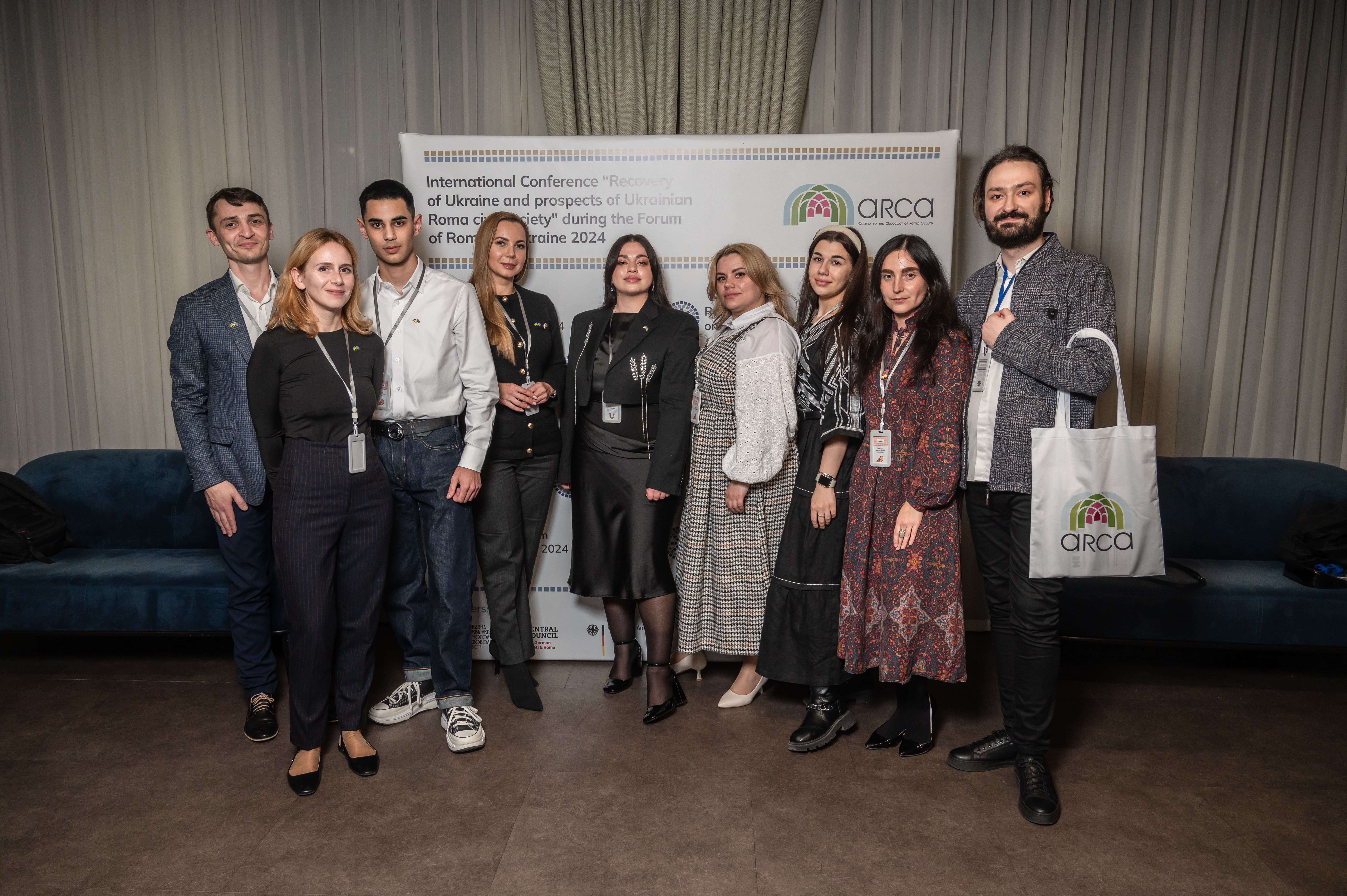 Photo: The team of ARСA Youth Agency for Roma Culture Advocacy
Photo: The team of ARСA Youth Agency for Roma Culture Advocacy
International Recognition of the Roma Question
The importance of improving the conditions of Roma was an issue emphasised by representatives of international institutions. The Conference was attended, among others, by Katarina Maternova, EU Ambassador to Ukraine; Matthias Schmale, UN_Ukraine Resident and Humanitarian Co-ordinator; and Stefan Müller, Political Advisor of the Central Council of German Roma and Sinti.
Participants of the Conference have agreed that the condition of Roma in Ukraine is a sort of a litmus test showing how mature is the society and how prepared it is to European integration. Another important idea that was voiced during the opening of the conference is that resolving the so-called ‘Roma issues’ shall pave the way for the resolving issues of other ethnic minorities and vulnerable social groups. After all, when interests of the most marginalised groups are protected, all other communities shall also benefit from it. Katarina Maternova, EU Ambassador in Ukraine, stressed that she had always been an advocate of Romani rights. She says that, as the historical experience has proved, every time a crisis broke out, Roma were always the first ones to suffer. «They have always been the punching bag. And this is something that has to be changed. We want to conduct a study in Ukraine, to assemble facts, in order to be able to see the actual picture. Because we are just unable to shape any strategy without this. The current strategy has been shaped on the basis of someone's ideas, not on the basis of facts—hence its inefficiency. I hope that this study will help us show the actual status quo and team up with the state authorities in our efforts», — Katarina Maternova has noted.
Eleni Tsetsekou, Chief of the Section of Romanis and Nomads at the Council of Europe:
«During each and every transition period, Romanis were always abandoned. Today, we want to prevent something like that from happening again. From the very beginning of the restoration of Ukraine, we should be able to guarantee the inclusion of Roma. They deserve to have their position in society to be reviewed».
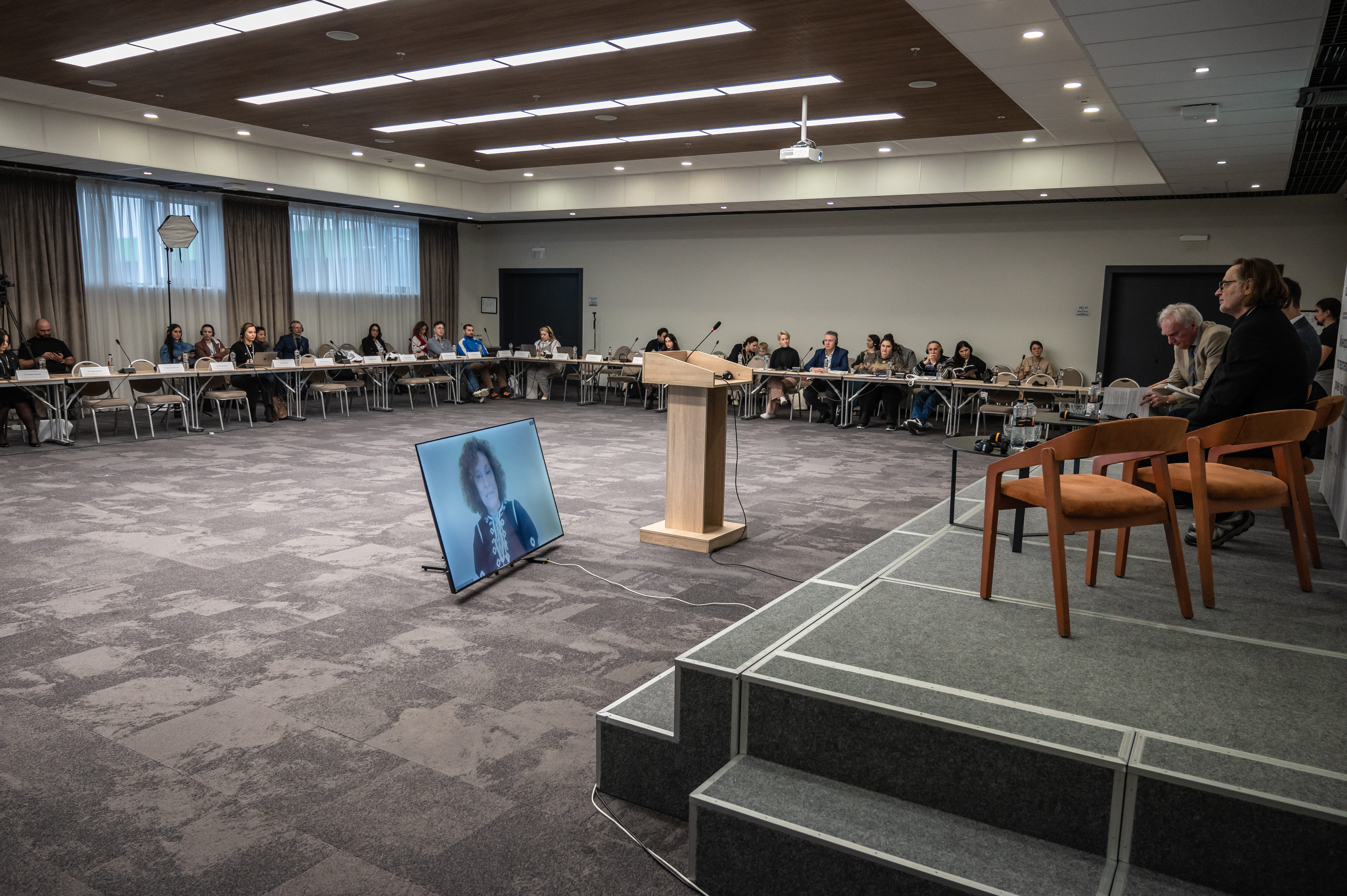
Matthias Schmale, Resident and Humanitarian Co-ordinator in Ukraine:
«From the very beginning of Russia's full-scale invasion into Ukraine, we have been collaborating with the Roma community and we, at the UN, have considered all of their needs. The dialogue is under way and aid is being provided to victims of war. Such aid includes, among other things, help with registration, provision of documents, and other kinds of support aimed at improving the well-being of Roma people».
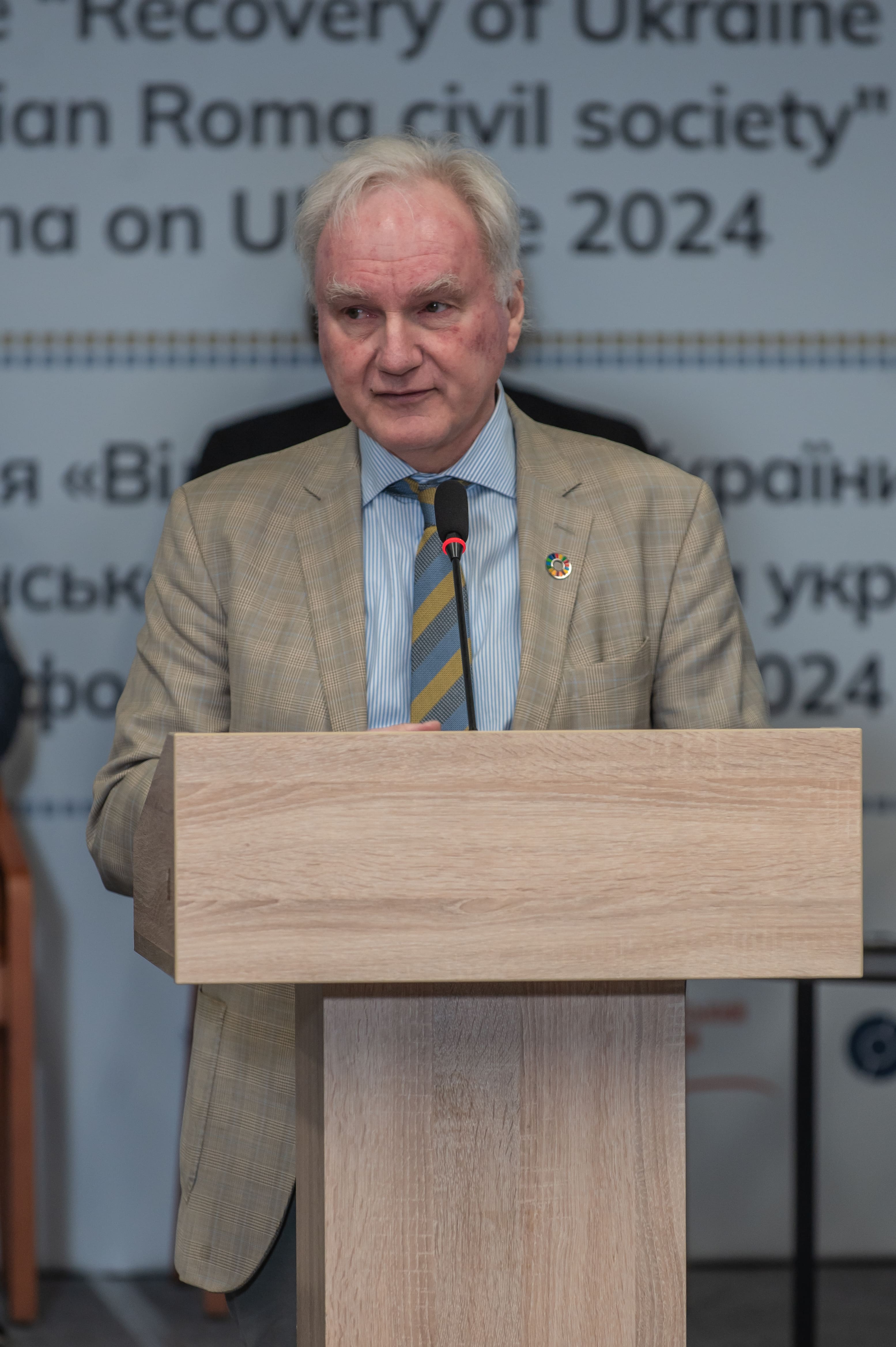 Photo: Matthias Schmale
Photo: Matthias Schmale
Volodymyr Yakovenko, Executive Director of ARCA Youth Agency for Roma Culture Advocacy:
«We realise that the threat which Ukraine has faced from the onset of full-scale Russian invasion forces the Ukrainian authorities to shift the focus of prioritisation elsewhere. That said, the Roma civil society asks the Ukrainian Government to keep putting in effort to build a more inclusive society in Ukraine and to make everything possible to integrate Roma into Ukrainian society and fight anti-Gypsyism».
 Photo: Volodymyr YAKOVENKO
Photo: Volodymyr YAKOVENKO
Recognise, Protect, Engage! The non-material needs of Roma in the course of Ukraine's restoration
Nonmaterial needs are fundamental rights that each and every citizen of our country is entitled to and that must be guaranteed to each and every one of us. In the context of Roma civil society, these are of particular importance, as Romanis do not have a country of their own which could protect their cultural and historical heritage. At the same time, the Romani language is a vanishing one, as the young generation does not have sources which it could use to learn it and is only able to learn the language from its native speakers. As we speak of inclusion, first and foremost, we mean recognition of identity and recognition of the contribution of the Roma community into our national history. Prejudice towards the Romani community not only impacts the physical safety of its representatives but also the preservation of its non-material heritage.
The Romani community shows how powerful it is in the conditions of war. A lot of Roma have taken up arms to defend their country whereas others are actively working for humanitarian missions. This contributes to positive dynamics of perception of Roma by the society; that, however, is not enough. We need to have a targeted state policy in place to combat bias and eliminate harmful stereotypes.
Education plays an important role here. The experience of other countries has proved that implementation of syllabi covering the history, culture, and value of the Roma people at schools helps lower the level of discrimination with regard to certain groups and contributes to mutual respect. Only through dissemination of knowledge shall we be able to overcome historically existing prejudice which still deteriorates social relations. By applying the inclusive approach, we shall be able to change the way in which we perceive the Romani identity: to see Romanis not as marginal people but as an ordinary ethnic group with its own cultural peculiarities. And, by the way, there also exist plenty of stereotypes with regard to Romani culture and traditions which need to be debunked. As of the present day, Romanis are not even represented in history textbooks (in the general historical context — editor). This is an issue we have covered in our magazine.
Natali Tomenko, Deputy Director of ARCA Youth Agency for the Advocacy of Roma Culture:
«As we speak of the discourse, we mean the inclusion of Roma communities into national narratives, ensuring their active participation in the social life and recognition of their contribution into the defence of Ukraine today, same as it was during the Second World War. Particular attention should be paid to elderly people, to victims of Roma genocide during the Second World War who are an important social stratum and have a unique experience of living through the second war in their life. This is why it is so important to document their testimony as it is an important element in the cause of preservation of the cultural heritage of Ukrainian Romanis. This is something that mist be included in the collection of national cultural institutions of our country».
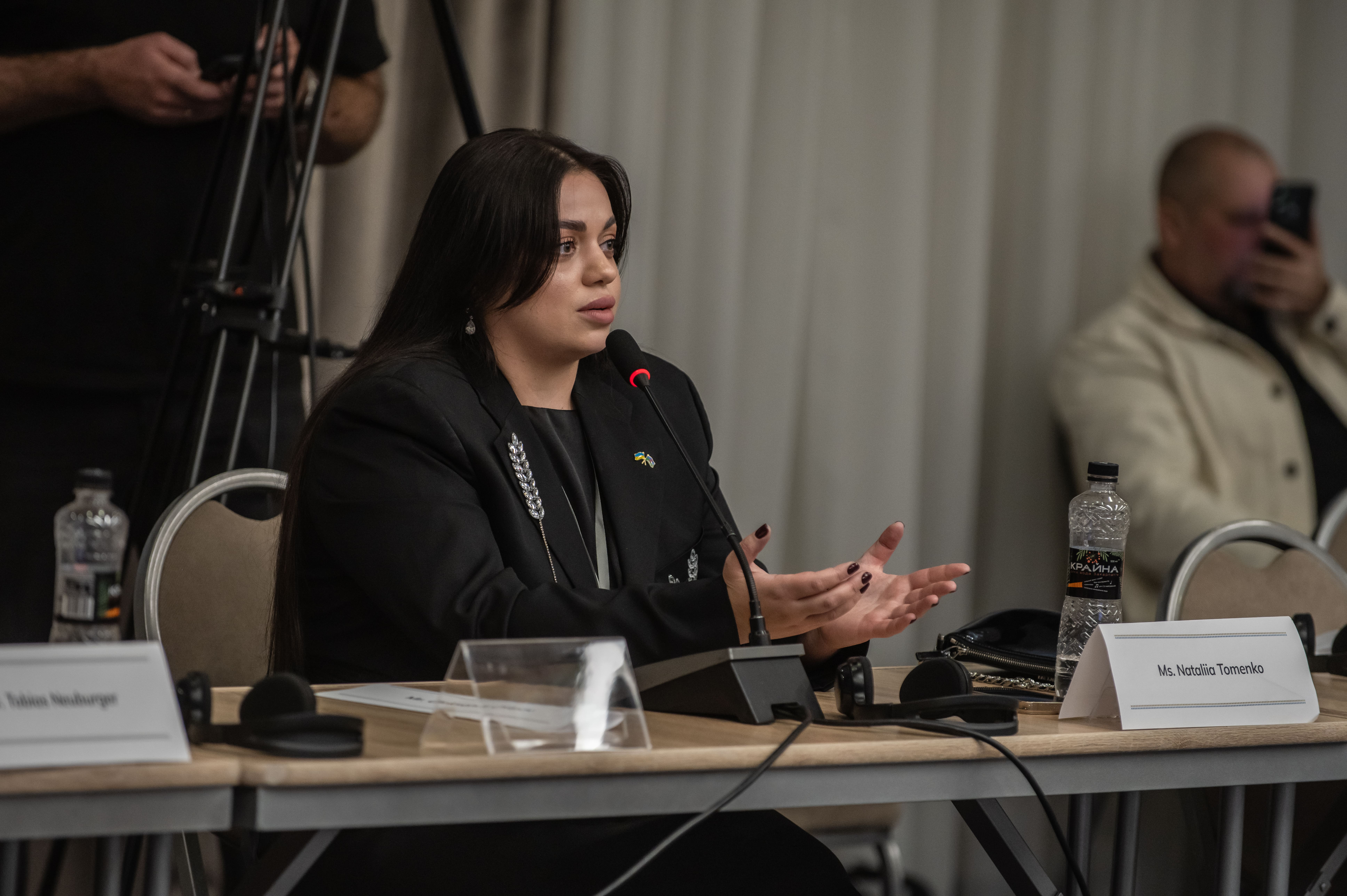 Photo: Nataliia Tomenko
Photo: Nataliia Tomenko
Oleksandr Osipov, Representative of the Authorised Official Ensuring Equal Rights and Liberties, Rights of Ethnic Minorities, Political and Religious Convictions:
«There may be 200,000 to 400,000 Romanis in total living in Ukraine—first and foremost, in Ukraine's Western Provinces. Over 100,000 representatives of the Roma community have been forced to leave their homes due to war. «Their major problems include the insufficient access to the job market, to information, to education, as well as the absence of documents (IDs). Experts estimate that almost 30,000 Roma in Ukraine have no IDs (birth certificates, passports etc). This is why, a project to simplify legal mechanisms has been initiated together in collaboration with EU institution. This pilot project is currently being implemented in the city of Mukachevo, Zakarpattia Province. International institutions, Roma NGOs, and state authorities have been engaged in this project».
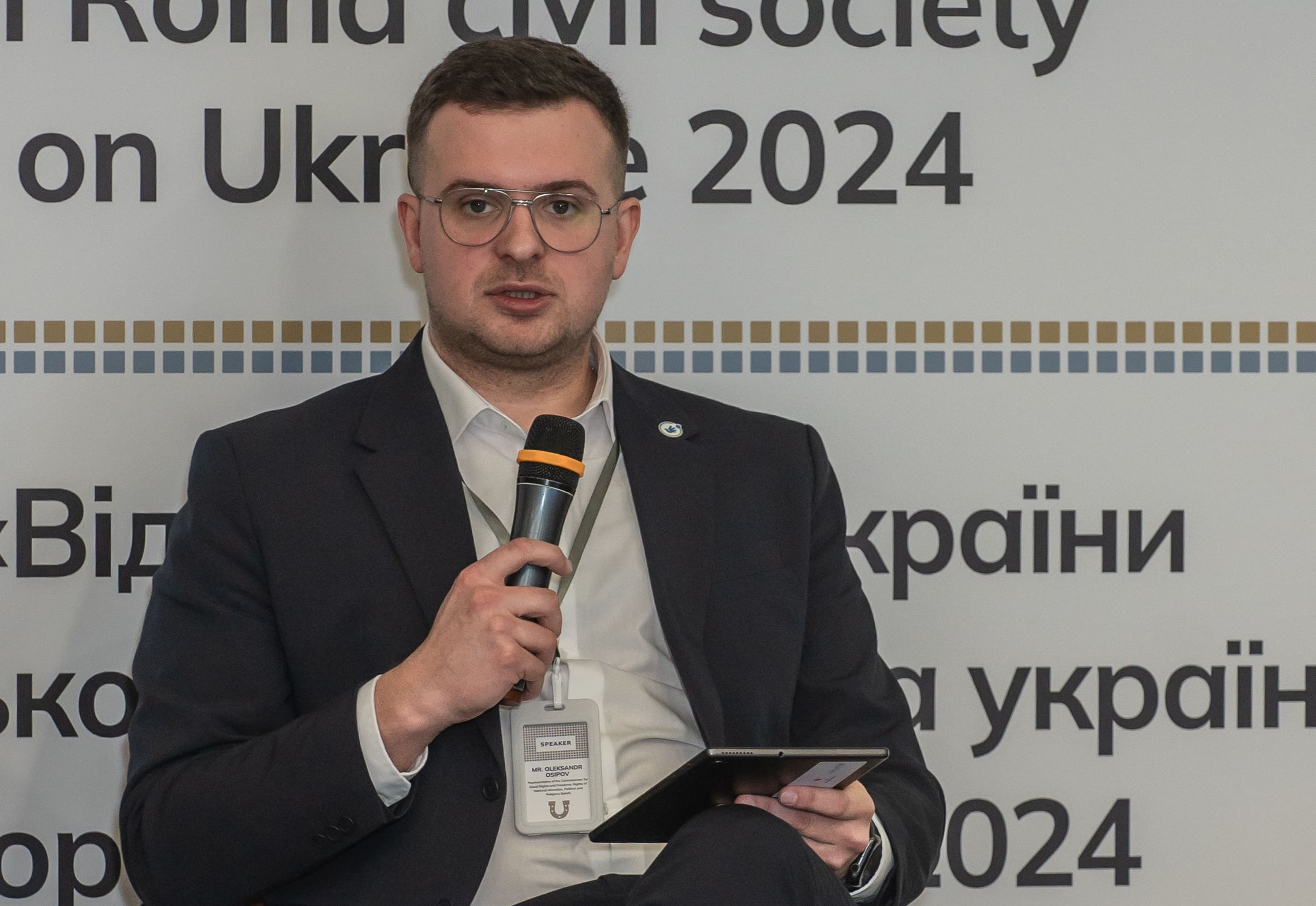 Photo: Oleksandr Osipov
Photo: Oleksandr Osipov
Dwelling, Job, and Education constitute a basis for restoration. Material needs of Romanis
The issue of provision of material support to the Roma community is also quite important. Many Romas have been forced to leave their homes; many have lost their dwellings and jobs. Considering this, provision of Roma with dwellings and making sure they have access to jobs and education are crucial issues and must be addressed. Before the full-scale invasion, there used to be cluster settlements of Roma in Donetsk and Luhansk Provinces. As of today, these regions have suffered perhaps the most serious destruction. So where is it that Roma would have to return to? And what about the fact that they have nowhere to live, nor do they have documents certifying their ownership of their residence? There are plenty of issues that need to be resolved. And these issues pertain various ethnic groups as well as Ukrainians that have become internally displaced persons in general.
Accommodation remains a crucial issue for Roman in another context, too. They often face prejudice on part of landlords who refuse to accommodate Romanis. In order to rectify this, the state must design special programmes which will help Roma find an accommodation and get proper documents. Romani children must have access to education. If we fail to do so, they will be unable to adapt and be successful in the present-day society.
Another important aspect which should be taken into consideration by the state is the reinforcement of economic capacity—particularly economic capacity of Roma women. As the war broke out, Roma men went to fight in the frontline whereas their women stayed back, alone, facing the everyday routine, providing for their families. A lot of Romani women are quite initiative when it comes to setting up a business of their own. And the state is capable of supporting this potential of theirs. In this respect, training programmes and access to funding may become a prerequisite for the successful development of women-led Roma businesses.
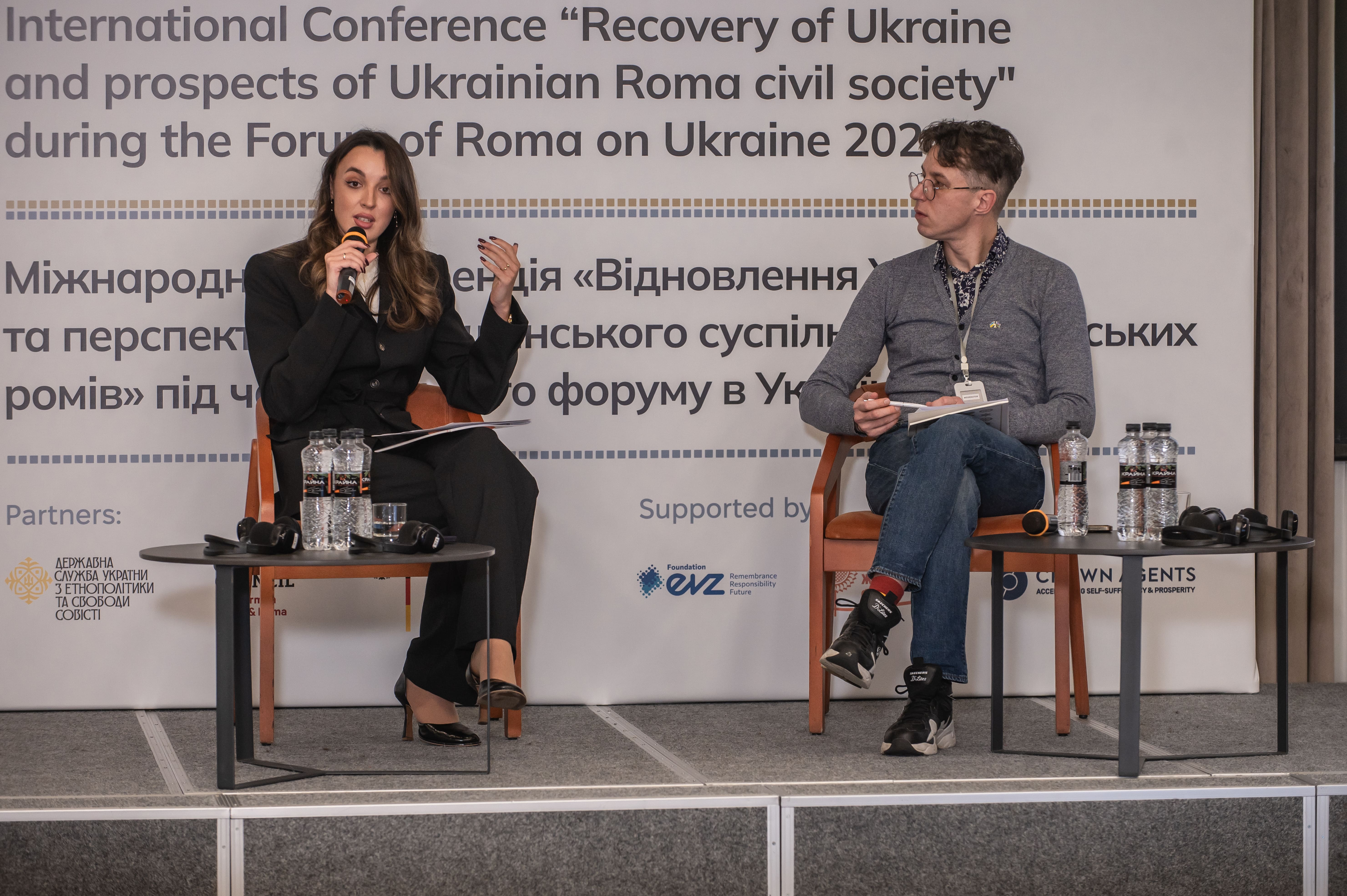 Photo: Anzhelika Bielova, President of the Holos Romni Association of Romani Women; Serhii Ponomariov, Monitoring and Assessment Manager at Polish Humanitarian Action
Photo: Anzhelika Bielova, President of the Holos Romni Association of Romani Women; Serhii Ponomariov, Monitoring and Assessment Manager at Polish Humanitarian Action
European Way for Ukraine: The Role of Roma in the Context of European Integration
Ukraine's accession to the EU has opened new prospects for Roma. This is another topic covered extensively during the Conference. Plenty of European politicians are known for their progressive views on minority rights. And this support is something that can help overcome the discrimination of Roma in Ukraine. Ukraine's EU accession, however, requires effort to be put in by the government and ciivl society, so that Ukrainian legislation can be adapted to European standards.
On the other hand, the European community has put forward a number of requirements to Ukraine as far as the condition of Roma is concerned. Fulfilment of these requirements is an integral prerequisite for European integration of our country. The principal threat for Roma on our way to European integration is anti-Gypsyism which remains a substantial obstacle for full-fledged life of the Roma community. The EU openly recognises anti-Gypsyism as one of the forms of discrimination which is well-known to and which is actively combatted by European countries. Ukraine should use the EU to shape efficient strategies for combatting anti-Gypsyism on the national level. The international experience, however, needs to be adapted to the Ukrainian realia—particularly, to the post-war context and post-war restoration.
This is why it is so important to support the Roma community and engage it into the process of European integration. Romani organisations already play a substantial role in the cause of human rights advocacy. Their participation in these processes will help, as Ukraine is going to adhere to the principles of equality and justice on its way to the European future.
Stefan Raffeiner, Political Advisor at the German Embassy in Kyiv:
«The Roma community is the most vulnerable one, not only in Ukraine but elsewhere across the EU. The German government has a special envoy tending to issues faced by the Roma community. One should keep in mind that there exist certain historical factors that have impacted the situation of Roma. And that Germany feels responsible for what happened decades ago—that is, in the times when Ukrainian territory was occupied by the Nazis, with everything that accompanied these times. Today, Germany supports Ukraine in a number of dimensions: politically, militarily, socially. And this support is going to last for as long as is required».
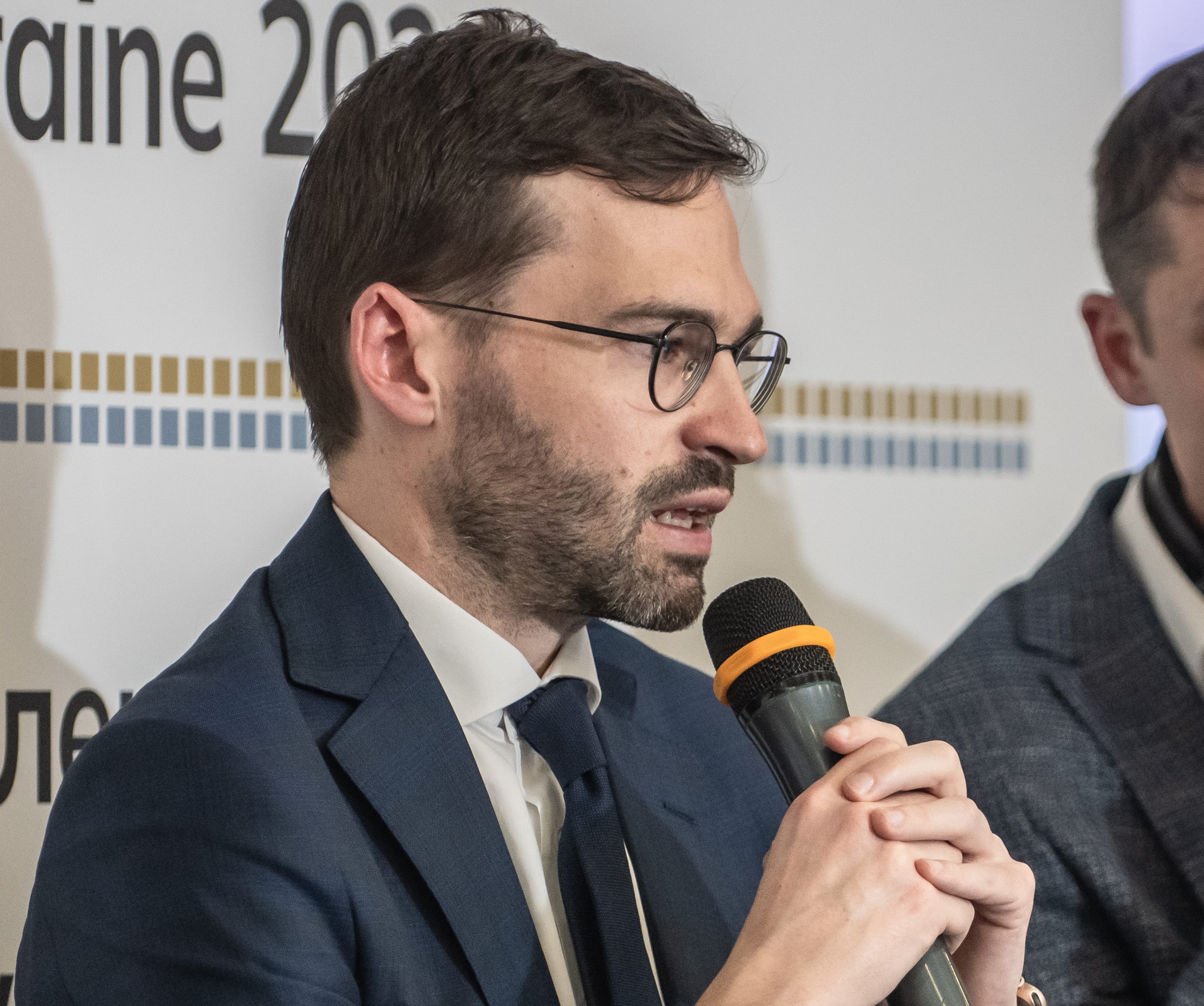 Photo: Stefan Raffeiner
Photo: Stefan Raffeiner
Marta Garcia Fidalgo, Co-ordinator of Romani Integration Policy at the General Directorate of the European Commission:
«Every year, the European Parliament observes a Roma Week. This enables us to hear the voices of different countries and the voice of the civil society. This is why, collaboration—particularly, regional collaboration—is of utmost importance. It covers various measures taken on the European level. I would like to ask everyone to engage in a direct dialogue with the civil society and with the European Parliament. This will impact the process of negotiations about Ukraine's accession to the EU. After all, we have to understand what is taking place locally. The civil society has to prioritise the cause of combatting anti-Gypsyism and has to resolve issues which the Romani community (first and firstmost, Roma women) face».
Protection of Romanis is a common cause for the future
Making sure that Roma rights are protected and their needs are satisfied is a cause pertaining not only to the Roma community but a cause directly linked to the future of Ukraine—a country willing to become a member of the European family. Equality and inclusion are not merely requirements of the modern-day world but a key to build a strong, united, and diverse country. Ukraine has a unique chance to use this impetus for changes and include Roma as full-fledged members of society.
The international conference entitled «Restoration of Ukraine and Civil Society Prospects for Ukrainian Romanis» has become an important step in the process of build-up of this new Ukraine. A reply to calls from the Roma civil society and a response to the implementation of recommendations offered will not only help Romanis but also reinforce the national unity and democracy as we will thus show the world that Ukraine is capable of tackling any challenges and building a fair and diverse country for each of its citizens.
At the end of the Conference, a Position Document was put together and presented. It contains recommendations for a number of entities which will help improve the position of Roma and contribute to Ukraine's European integration.
Recommendations for Ukrainian State Authorities:
1. Integrate Roma interests into all areas of restoration: in the process of restoration, needs of Romanis should be considered—particularly as far as accommodation, education, and employment of internal refugees and other vulnerable categories is concerned;
2. Combat anti-Gypsyism: nationwide measures are to be taken in order to counter anti-Gypsyism, including awareness campaigns and education programmes helping overcome harmful stereotypes;
3. Ensure Social and Economic Inclusion of Romanis: Roma employment in the realm of restoration should be facilitated; education programmes helping Romanis get qualifications required to participate in the rebuilding of the country should be set up;
4. Provide support to Roma veterans and Romani military families: ensure equal access to social programmes is to be ensured for Roma veterans and their families;
5. Facilitate the process of obtaining documents: mechanisms should be in place which would make it easier for Roma to obtain IDs (particularly for those Romanis who have no IDs at all—and are thus barred from receiving basic services).
Recommendations for the International Community:
1. Provide support to Ukrainian national programmes for Roma: provide technical and financial support to the implementation of strategies and programmes aimed at improving the situation of the Romani community;
2. Support Roma NGOs: provide Romani NGOs with resources and institutional support in order to facilitate their participation in the processes of restoration and protection of Roma rights;
3. Help fight anti-Gypsyism: team up with the Ukrainian government in order to implement measures to eliminate anti-Gypsyism, using the European experience and best practices of elimination of discrimination;
4. Support education and culture initiatives: fund programmes aimed at preservation and popularisation of the Roma culture and language, thus contributing to the social integration of Roma.
Recommendations for the Ukrainian civil society:
1. Double down on Roma rights advocacy: active work on promotion of Roma rights on all levels—particularly within the framework of restoration of the country.
2. Engage Roma in the process of reconstruction: set up initiatives and programmes that will contribute to the engagement of Roma into the process of restoration—particularly through training and employment.
3. Education and awareness campaigns: work with the public in order to increase awareness of the Roma culture, to combat anti-Gypsyism, to overcome stereotypes, and to foster social cohesion.
4. Support network for Roma: set up networks and associations to support Roma communities, particularly among internal refugees and Roma veterans, in order to ensure that their social, cultural, and economics needs are satisfied.
The above recommendations will help set up a basis to ensure that Romani rights are respected, that full-fledged participation of Roma in the restoration of Ukraine is ensured, and that the role of Roma in our society is reinforced.
You can read the Position Document in full HERE
So, what does it all boil down to?
The Roma community has been oppressed and discriminated against for centuries. It has been the victim to prejudice, unfair treatment, and social alienation. In the times of crisis, during tumultuous historical periods, Roma have always been among the most vulnerable categories. For centuries, they have been persecuted, denied rights, nay, even murdered. Today, we are facing another turn of history, as we are creating a new, strong Ukraine.
After the war, not only we are going to face the issue of how to rebuild our cities and restore our infrastructure but an important issue on how to restore our society wherein each of us is to feel like a full-fledged member of a common nation. This is the moment which we should use to build our country which is going to defend the rights of each of its citizens—regardless of his or her ethnic or social origin.
Our struggle is one not only for the territorial integrity but for the right of each and every one of us to be oneself. Ukraine strives to prove the fact that its uniqueness is based on diversity, whereby each and every ethnic group feels free and protected. Inclusiveness and respect for diversity are foundations on which our present-day state stands. Integration of the Roma community into the process of Ukraine's restoration is a test for our society—one ascertaining if it is capable of accepting, respecting, and appreciating diverse cultures, of guaranteeing equal rights and dignity for all.
